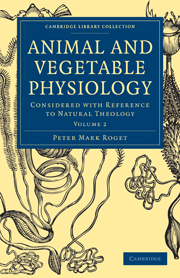CHAPTER III - DECLINE OF THE SYSTEM
Published online by Cambridge University Press: 05 October 2010
Summary
To follow minutely the various steps by which Nature conducts the individual to its state of maturity, would engage us in details incompatible with the limits of the present work. I shall only remark, in general, that during the period when the body is intended to increase in size, the powers of assimilation are exerted to prepare a greater abundance of nourishment, so that the average supply of materials rather exceeds the consumption: but when the fabric has attained its prescribed dimensions, the total quantities furnished and expended being nearly balanced, the vital powers are no longer exerted in extending the fabric, but are employed in consolidating and perfecting it, and in qualifying the organs for the continued exercise of their respective functions, during a long succession of years.
Yet, while every function is thus maintained in a state of healthy equilibrium, certain changes are in progress which, at the appointed season, will inevitably bring on the decline, and ultimate destruction of the system. The process of consolidation, begun from the earliest period of developement, is still advancing, and is producing in the fluids greater thickness, and a reduction of their total quantity; and in the solids, a diminution in the proportion of gelatin, and the conversion of this element into albumen.
- Type
- Chapter
- Information
- Animal and Vegetable PhysiologyConsidered with Reference to Natural Theology, pp. 619 - 624Publisher: Cambridge University PressPrint publication year: 2009First published in: 1834



